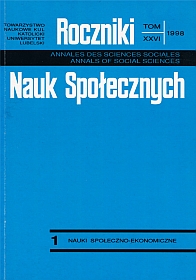Immanentny i instrumentalny aspekt dobra wspólnego
Abstrakt
In Christian social thought the opinions of various authors, as regards the essence of the common good, focus on two standpoints: ethical solidarism and social ethicism. Those two orientations lie at the foundations of the controversy: is the common good an institution, instrument, means, or does it constitute a perfection? The representatives of the Lublin School of Catholic social doctrine, connected with the Catholic University of Lublin, also take a standpoint as regards the above dilemma. It is their belief that the full contents of the common good is made up of two factors: conditions and institutions on the one hand, and, on the other, reaching perfection thanks to them. Thus one may say that the Lublin scholars, though they draw a lot on the problems of solidarists and the Freiburg school, yet they do not identify themselves directly and closely with any of these directions. Rather, they tend towards a synthesis of the immanent and instrumental conception of the common good. At the foundation of this kind of understanding of the common good there is an integral conception of man and his development. The final character of human nature combines not only the aforementioned aspects, but also the kinds of the common good. Thus the integrity of that moral reality, which is bonum commune, is opened to us.
Copyright (c) 1998 Roczniki Nauk Społecznych

Utwór dostępny jest na licencji Creative Commons Uznanie autorstwa – Użycie niekomercyjne – Bez utworów zależnych 4.0 Międzynarodowe.


